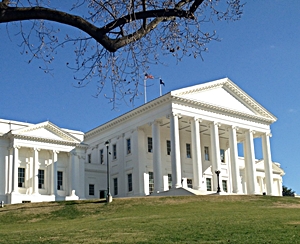As Democrats take control of Senate, Richmond increasingly mirrors Washington

CHANGING TIMES: Politics could start looking just a little more like Washington, D.C., in Richmond.
By Kathryn Watson | Watchdog.org, Virginia Bureau
ALEXANDRIA — If you take the time to listen to any legislative committee meeting or debate on the House or Senate floor in Richmond, you’re bound to hear at least once that Virginia just doesn’t practice uncompromising, pushy partisan politics like her neighbors to the north of the Potomac River in Washington, D.C.
It’s the “Virginia Way.”
But the political landscape is changing, and not just because the makeup of Virginia’s governing bodies now reflects Washington, with Democrats controlling the executive branch and Senate, and Republicans controlling the House.
“The likely result will really be something like we see in Washington,” said Geoff Skelley, a political analyst with the University of Virginia’s Center for Politics in Charlottesville.
In a nutshell, expect more gridlock. And expect more policy plays from the executive branch.
During the past few years, Republicans have been able to move much of their agenda through the legislative process, with Republicans in control of the executive branch, House, and for all intents and purposes, the Senate, with an even 20-20 split and tie-breaking vote in former Republican Lt. Gov. Bill Bolling. It was the closest thing to a cakewalk Republicans could hope for — something Democrats highlighted in the gubernatorial election, particularly on social issues like abortion.
But now, with Democrat Lynwood Lewis the official victor by 11 votes in the Monday recount over the 6th Senate District race, Democrats have control of the Senate with the tie-breaking vote of Democratic Lt. Gov. Ralph Northam.
That leaves Republicans in defense mode — flipping the field all but entirely.
But House Republicans still have a solid majority — 2-1. And they’ve already made it clear that they aren’t giving up on big-ticket items like Medicaid expansion.
That could mean compromise — certainly when it comes to something like mental health reforms, Skelley said.
But on just about every other issue, it likely means gridlock — the kind of gridlock Virginia lawmakers go out of their way to say they avoid.
And, when gridlock comes, Democrats have the executive branch on their side, just as Obama does in Washington.
Gov. Terry McAuliffe already has shown he isn’t afraid to act with a pen and paper with his executive orders on gift caps and employment protections for the lesbian, gay, bisexual and transgender communities on his first day in office, to the protest of some Republicans who said he was legislating through the executive branch.
And Attorney General Mark Herring has shown he isn’t afraid to take a stand by not only backing away from defending the state’s gay marriage ban, but defending the plaintiffs in a case against the state on the issue. That isn’t sitting well with Republicans, some of whom have filed a petition for the governor to appoint outside counsel to defend the ban the people of Virginia voted in as a constitutional amendment in 2006.
“He (McAuliffe) is going to have to get Republican support to get legislation passed anyway,” said John McGlennon, department chairman and professor in the Government Department at the College of William and Mary in Williamsburg. “So in terms that he has tools in terms of executive power, I expect him to use them. And certainly Virginia governors have unusually high authority during their terms to take action,” he said, referring to the relatively greater power Virginia governors have since Virginia is the only state where a governor is limited to one term.
“So I don’t expect Governor McAuliffe will be different from other governors in terms of willingness to use those,” McGlennon said. “But yet, governors are constrained, because they recognize that it can create an adversarial relationship to an even greater degree than normal partisanship does.”
To anxious Republicans, it’s reminiscent of the comment President Barack Obama made earlier this month — “I’ve got a pen, and I’ve got a phone.” And it harkens back to the multiple times Obama has delayed aspects of his signature health care law without a vote from Congress.
“Obama doesn’t think he can get anything through the legislature because of House Republicans. So he’s doing what he can in terms of his policy views, and you’ll probably see something somewhat similar from McAuliffe,” Skelley said.
And taking action that way will ruffle Republican feathers — as it already has in the less than three weeks since McAuliffe, Northam and Herring took their oaths of office.
“I think we’ve seen that action in Washington by President Obama using extraordinary means way beyond the U.S. Constitution,” said Steve Landes, vice chairman of the Medicaid Innovation and Reform Commission, after McAuliffe announced his budget proposal to give him the authority to call the shots on expansion. “And I hope Gov. McAuliffe is not going to go down that path and try to accomplish things without the General Assembly’s approval, because the Virginia Constitution is pretty clear. The power to appropriate is only with the legislative branch.”
The “Virginia Way” still echoes in the halls of government in Richmond. But expect things to get a little less friendly, a little more fierce, and a little more like the much-disparaged neighbor to the north that Virginia is becoming increasingly dependent upon for its economy, and in some ways, increasingly like.
Kathryn Watson is an investigative reporter for Watchdog.org’s Virginia Bureau, and can be reached at kwatson@watchdog.org.
The post As Democrats take control of Senate, Richmond increasingly mirrors Washington appeared first on Watchdog.org.







